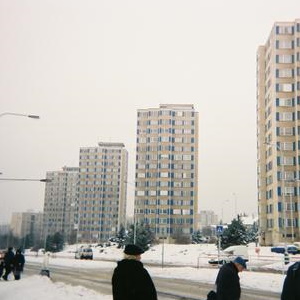Social Structure
Rudé Pravo, Youth Discontent
In Communist Eastern Europe much propaganda was directed toward young people, who party leaders correctly viewed as forces important for the future of the state.
Samizdat, Houses of Culture and Entertainment
During the Cold War era an interesting public space called "the house of culture" (or sometimes "the palace of culture") proliferated throughout the East Bloc.

Panelaks and Housing Estates
During the first half of the 20th century shortages of hygienic, affordable housing were common in Eastern Europe.
Samizdat, Five Year Plan
In 1986 the Czechoslovak Communist Central Committee approved its Eighth Five Year Plan since 1948, which stayed in effect, with modifications, until 1990.
Samizdat, Consumer Goods
Czechoslovaks watched the unfolding of perestroika [restructuring] in the Soviet Union and its slow introduction into their own economy with great interest, although there were obstacles to doing so.
Preparing for Martial Law in Poland
In August 1980, a worker's strike began in Gdansk, Poland in reaction to the struggling economy and massive shortages. In a compromise to resolve the strike, the Communist government legalized Solidarity, but this only increased tensions as the shortages failed to improve.
Economic Woes for the Warsaw Pact
The Warsaw Pact was based around the principle of cooperation and mutual assistance for its member states, including both military agreement and economic cooperation. In reality, the Soviet Union decided both the military and economic policies for all of the Warsaw Pact's member states.
Unacceptable Liberalism in Poland
Following a secret telephone conversation with Stanislaw Kania (first party secretary of the Communist Party in Poland [PZPR]), Leonid Brezhnev (first party secretary of the Communist Party of the Soviet Union [CPSU]) sent telegrams about their discussion to Soviet ambassadors throughout the regi
Who Controls Poland?
Following the first congress of Solidarity held in September 1981 in which Solidarity leaders adopted "An Appeal to the Peoples of Eastern Europe," Leonid Brezhnev (first party secretary of the Communist Party of the Soviet Union [CPSU]) secretly called Stanislaw Kania (first party secretary of t
Exchange of Opinions on the Polish Question
In September 1981, Solidarity held its first Congress in which it adopted a document, "An Appeal to the Peoples of Eastern Europe," a message geared toward working-class people in other Soviet bloc countries.